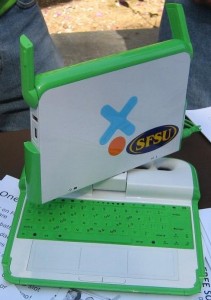You can find the full essay on the olpc wiki.
Summary: The formidable expansion of the digital environment in our planet is one of the most urgent challenges of this century. This new environment supports most human activities around the world today. Among the multiple socialchanges empowered by the digital environment we must emphasize the transformation of the education of the new generations, the so-called “digital natives.†The access to this digital environment is now becoming a hope for millions of students and teachers, a way to overcome ignorance and poverty. It is a human right, and a value in itself.
At the same time the digital environment is becoming the common ground for the mind, brain and education sciences. We think that the future of
education will depend on the increasing integration of these sciences. And education is the hope of humanity. The teacher is facing new pedagogical challenges in a globalized world. We should however acknowledge the fact that while we have significant information about the learning brain we lack a similar knowledge of the teaching brain. Our expectation is to bridge this neuro-cognitive gap in the next years.




